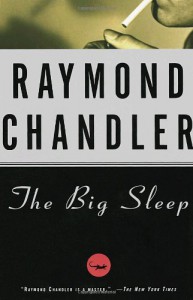

~~Moved from GR~~
The Big Sleep
by Raymond Chandler
The Big Sleep is the quintessential hardboiled detective novel. While not the first, this novel was close, and I believe has had the strongest influence on the detective noir genre (and its odd stepchild, urban fantasy). Philip Marlowe is the first of the fast-talking, wise-cracking, constantly beat-up private eyes constantly over his head, obsessed with an old-fashioned chivalry, and, despite his vaunted cynicism, consistently disappointed by the world around him. Chandler's quote about the tarnished knight walking the mean streets is a reference to his protagonist, yet Marlowe himself is so disillusioned that he even questions the applicability of chivalry:
“I looked down at the chessboard. The move with the knight was wrong. I put it back where I had moved it from. Knights had no meaning in this game. It wasn't a game for knights.”
I like Marlowe, and I like his books. Despite myself. The books are absolutely the most sexist pieces of fiction you can come across outside of Faulkner and the Vulgate Cycle of the legend of King Arthur. Marlowe encounters an absolutely embarrassing surplus of femme fatales. Women in Marlowe's world are not immoral; they are amoral. They are animals, without the wits or humanity to even have a sense of morality and the will to reject it. The book (and its sequels) are full of animalistic descriptions of the women Marlowe meets, and despite his attempts to rescue the damsels in distress, they always end up being the cause rather than the victim. This theme is epitomized by the symbolism in the opening scene:
There was a broad stained-glass panel showing a knight in dark armor rescuing a lady who was tied to a tree and didn’t have any clothes on but some very long and convenient hair. The knight had pushed the vizor of his helmet back to be sociable, and he was fiddling with the knots on the ropes that tied the lady to the tree and not getting anywhere. I stood there and thought that if I lived in the house, I would sooner or later have to climb up there and help him. He didn’t seem to be really trying.
The greatest tragedy of Marlowe's life is that no matter how hard he tries, he cannot untie the women from the tangles they have made of their lives; he cannot push the women back onto their pedestals after they have fallen from grace. At one point, after one of his female clients leaves his rooms, Marlowe is disgusted by the memory of “her small corrupt body”. Like the knight in the stained-glass window, Marlowe cannot rescue the women from the intricate web of corruption that encircles them.
As he notes,
“You can have a hangover from other things than alcohol. I had one from women.”
In discovering the ubiquity of immorality, Marlowe has lost some of his own naivety. Continually confronted by a cynical acceptance of corruption, he is forced to question whether honour has a place in his immoral society. Marlowe recalls a friend’s rationalization: “I’m…as honest as you could expect a man to be in a world where it’s out of style”. Marlowe, too, must choose, but in his world of greys, there is no righteous path; he must choose which aspects of his integrity to sacrifice.
One of my favourite aspects of the book is the style. Its stark sentences, vivid imagery, and quintessentially thirties dialect became a trademark of the genre. My favourite aspect is the use of bizarre yet expressive similes, for example,
"Dead men are heavier than broken hearts."
The plot, however, is something of a mess. Chandler earned my ire by taking cheap shots at Agatha Christie in his essay about "rules for detective novels", claiming her books require complete suspension of disbelief and elaborate, unnatural characters and plots. Chandler's books always depend on people doing stupid things and absolutely stupendous concatenations of coincidences. Famously, when they made the movie of The Big Sleep, the screenwriter was unable to untangle the plot and, completely desperate, eventually cabled Chandler to ask him who actually shot the chauffer. He responded with something of the form, "How the hell should I know?"
But for all that, Chandler built a genre, and Marlowe is incredibly likeable, even if you don't want to like him. He was the first of the big-hearted, outwardly cynical, inwardly idealistic, suicidally smart-mouthed, fast-talking PIs with a colorful turn of phrase and simile that was both built upon and parodied by hundreds or perhaps thousands of writers. Chandler's character and world epitomized and engendered a genre.

 8
8




